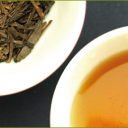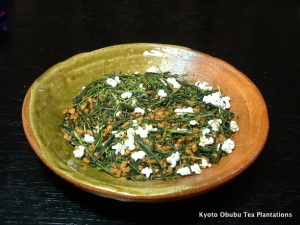Leaf Type: Green
Where to Buy: Obubu Tea
Product Description:
Balancing sweetness with bitterness, the Sencha of the Earth or 大地の煎茶, was named because it comes from standard tea plants over 30 years old. The strength of these plants is simply amazing, and we can feel the power of the earth as we drink it. Grown on northwest facing slopes near the Wazuka River.
Taster’s Review:
Another fantastic Sencha from Obubu Tea!
It brews to a pale green that is much more translucent than Obubu Tea’s Sencha of the Autumn Moon that I reviewed previously. It possesses a slightly nutty aroma with a hint of spice in the background, and a vegetable front note.
This tea tastes so fresh and vibrant, like a run through a dew-drenched meadow of clover on a sunny afternoon. There are strong notes of vegetation that are a little more grassy than vegetable, and unlike some Sencha teas I’ve encountered, I don’t get that heavy buttery quality. There is a note of creaminess, but it is more like creamed spinach than it is creamy butter.
This tea is appropriately named, because there is also an earthy quality to the flavor of this tea that I don’t think I’ve ever experienced before with another Sencha tea. With this earthy note and the aforementioned grassy tones, this tea truly is a Sencha of the Earth!
This Sencha is delicious hot or iced, but I recommend trying it first as a hot tea so that you can fully appreciate all of the subtleties that this tea has to offer, because as it cools some of the flavors mute slightly, and this becomes much more vegetal-tasting than it is hot. One thing worth mentioning, though, is that as it cools, I notice more of a gentle pepper-y taste in the background that is quite delicious.
Regardless of how you choose to serve it, you should definitely try this tea!
Sencha of the Autumn Moon from Kyoto Obubu Tea Plantations
Leaf Type: Green
Where to Buy: Obubu Tea
Product Description:
Otsukimi (お月見) literally means “moon viewing” and is closely associated with Japanese festivals celebrating the moon in Autumn. It is at this time of the year when the moon appears brightest, and Japanese eat certain dishes such as tsukimi dango (round, white dumplings), edamame (soybeans), Japanese chestnuts, etc.
Our Otsukimi Sencha or Sencha of the Autumn Moon was named after this Japanese tradition not only because we harvest it in late September when the festivals occur, but also because the tea leaves and stems produce a bright yellow-green sencha with a round flavor.
Taster’s Review:
On the flavor guide for this tea on the Obubu Tea website, it suggests that the aroma of this tea “reminds you of a full moon.” Now, I don’t know if the aroma actually reminds me of a full moon, or if the mere suggestion evokes the image, but, I will say that the aroma is a pleasant one. Vegetative, but with notes that do remind me of the scent of the evening air on a clear night: the trees, the crisp breeze, and hints of flower in the distance. So, perhaps it does remind me of a full moon, or at the very least, a cool evening in autumn.
The tea brews to a rather murky shade of green, not an unpleasant color, but not the bright green that I often achieve from brewing a Sencha tea.
But do not let that sway you, because the flavor is delightful. It is rich and vegetative with a nutty undertone. There is an intriguing bittersweet flavor to this cup. Not a bad “bitter” – but a savory one that perks the taste buds right up and calls upon them to take another sip to experience the taste yet again.
The taste is very fresh and slightly grassy, which is something I’ve come to expect from a good quality Sencha such as this, however, this one doesn’t possess that sweet butter taste of some other Sencha teas, this one is more of a bittersweet kind of Sencha, making this an ideal choice for those who find that buttery feel and taste a little off-putting. The finish offers a very light astringency. The aftertaste is clean and lightly sweet with hints of flower and grass.
The tea has a very well-rounded flavor; very palate pleasing! Overall, a very enjoyable cup of Sencha!
Houjicha – Dark Roast from Kyoto Obubu Tea Plantations
Leaf Type: Green
Where to Buy: Kyoto Obubu Tea Plantations
Company Description:
Roasted green tea, or Houjicha is unlike any green tea you’ve tasted before. With a richly smokey flavor that is simultaneously light and sweet, houjicha has none of the bitterness of traditional green teas. And like decaf coffee, the roasting process removes the caffeine from the leaves making it the perfect after dinner / before bed drink.
Taster’s Review:
I have always been fond of Houjicha (or Hojicha) green tea because I really enjoy its deep roasted flavor. This is one of the best Houjicha teas that I’ve encountered.
Even though the tea has a roasted and somewhat rustic taste, the tea still maintains an unbelievably smooth flavor and consistency. It has a slightly earthy/woodsy, smoky note that unites almost seamlessly with the roasted flavor. It has a silky mouthfeel that is almost a contradiction to the roasted earthiness of this tea. A delightfully delicious contradiction.
What I like best about Houjicha tea is the sweet, caramel taste that the roasting process imparts upon the leaves. It seems to remove much of the vegetative notes of a typical green tea, and the buttery notes seem to turn to a rich, buttery caramel taste. So YUMMY!
And I learned something new by visiting the Obubu Tea Store… I did not know that the roasting process removes the caffeine (I don’t know how much of the caffeine it removes) – but it is certainly good to know! This Dark Roast Houjicha would make an incredibly comforting tea to enjoy on the forthcoming cold autumn evenings.
Genmaicha from Kyoto Obubu Tea Plantations
Tea Information:
Leaf Type: Green
Where to Buy: Kyoto Obubu Tea Plantations
Company Description:
Made with a little bit of luxury, Obubu’s Genmaicha (玄米茶) or Brown Rice Tea is made with 100% Japanese-grown sweet mochi rice combined with our Sencha of the Autumn Moon. The strong, sweet flavor of the roasted brown fills the air as the tea steeps and mixes with the sweetness and bitterness of the sencha to produce a delicious and natural tea.
Taster’s Review:
Genmaicha has been a long time favorite of mine. Even when I wasn’t really digging a lot of green teas (there was a time when I was not as enthusiastic about green teas as I am now), I have always found a good cup of Genmaicha to be very enjoyable.
So when I received this sample of Genmaicha, I was very eager to try it. And I am SO glad that I did! This is a delightful Genmaicha – one of the very best I’ve ever tried.
What makes this one significantly different is the Sencha base that is used. Very often, the green tea used to make a Genmaicha is a Bancha. Now, I like Bancha tea quite a bit, and even though Bancha is actually a lower grade of Sencha, Sencha and Bancha teas taste a bit different. Bancha teas tend to have a natural toasted flavor to them that stands out. While some Sencha teas that I’ve tasted do have a slight roasted/nutty quality to them, it is not as prominent as the toasted note that I get from a Bancha.
And these differences in flavor are significant when it comes to Genmaicha. As it is made by blending green tea with toasted and popped rice, there is a roasty-toasty flavor that is one of the most prominent (and appealing) characteristics of a Genmaicha tea. So, when a Genmaicha is blended using a Bancha, you compound that signature roasty-toasty flavor of the Genmaicha. But when a Genmaicha blend is made using a Sencha, the flavor becomes slightly different… slightly more complex.
The backdrop of this tea is a bittersweet flavor – not bitter … but, as I’ve described on Steepster, it is more like semi-sweet to me. It has a pleasant nuttiness that is accentuated nicely with by the popped rice, which has its own natural sweetness. It is very delicious, pleasantly sweet, and extraordinarily delicious!
Attention Genmaicha fans: this Genmaicha is NOT to be missed!




